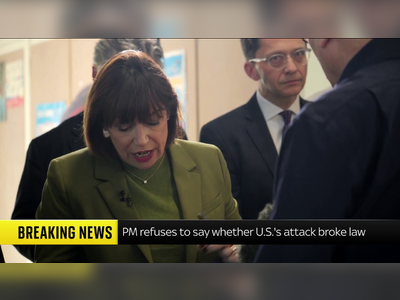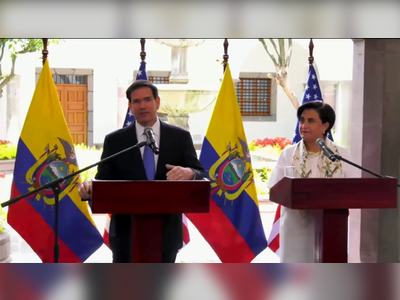
After political violence, Peru reckons with economic fallout
The anti-government protests that killed dozens and dealt body blows to some of Peru’s most critical sectors are starting to wane but they have left their mark on the country’s economy.
Operations in the country’s copper-rich south are steadily ramping up and the iconic ruins of Machu Picchu, the nation’s crown jewel, are once again open to foreign tourists.
But for three months, vital highways were choked off by boulders and burning tyres, lucrative copper mines were paralysed and the rail lines leading to the ancient Inca citadel, like much of Peru’s economy, were ground to a halt amid shockingly violent demonstrations.
Surveying the damage inflicted upon a monolithic mining sector and the nation’s iconic brand as a bucket-list travel destination, analysts told Al Jazeera they see signs of a cautious restart of these key sectors. However, months of turmoil, a continuing political standoff and threats of renewed protests will pose serious challenges to the country’s economic growth in 2023, they warned.
As a clearer picture of the economic fallout has emerged, they have said one thing is certain: more instability will hinder mineral investment and deter tourism – economic engines which account for 10 percent and 3.9 percent of the nation’s gross domestic product (GDP), respectively.
“Our estimate for GDP growth in 2023 is 2.5 percent, with a significant downward bias,” Hugo Vega, an economist with BBVA Research Peru, told Al Jazeera by email. The effect of the political crisis on January alone subtracted approximately 0.3 percent from this year’s growth, he said. Incorporating February and March, plus the longer-term effect on tourism and overall investment paints “a very challenging picture for the year as a whole”, he said.
Even in a country as inured to political chaos as Peru, which has endured seven presidents in seven years, the chaotic ascension of President Dina Boluarte in December following the removal of her predecessor, Pedro Castillo, plunged the country into violence unseen in decades.
Despite a 77 percent disapproval rating, Boluarte has held a white-knuckled grip on power and a deadlock between the executive and judiciary has stalled hopes for new elections this year, a key demand of protesters.
Impact on mining
 Protests hit Peru’s mining and tourism sectors, both key revenue earners
Protests hit Peru’s mining and tourism sectors, both key revenue earners
The unrest, which has left more than 50 dead, has been concentrated in the mineral-rich and heavily Indigenous highlands, where vast copper reserves have allowed Peru to surpass China as the world’s second-largest producer.
In Apurimac, a region convulsed by recent unrest, campesino communities demanding President Boluarte’s resignation blocked a highway leading to the China-owned Las Bambas mine, which produces about 2 percent of the global copper supply, disrupting transport of materials. In neighbouring Cusco, protesters set workers’ housing aflame at the colossal Antapaccay mine, which briefly suspended operations.
While the extent of impacts to production were still unclear, experts noted a long history of social conflict between local communities and mining companies in the region – and that assuming production held steady amid recent turmoil, any temporary logistical snags due to blocked highways would not pose long-term damage to the sector.
“If you continue to produce, but you cannot get your product out, when there’s a new possibility, you export it and there’s a quick rebound in terms of the volume of exports and fiscal incomes,” said Carlos Monge, a researcher at Centre for Studies and Development Promotion or DESCO. “[But] if you have to close down the operation, then it’s not easy to start that production again, because the value chain is broken down.”
The extractive sector, which accounted for 62 percent of Peru’s exports, contracted by 3.6 percent year-on-year in January and there is concern that continuing instability would repel private investment, which last year amounted to $5.4bn.
But Monge and other analysts emphasised the mining industry’s resilience amid political turmoil, as well as copper’s critical role in an electric vehicle boom.
“In broader terms, there are two positive trends to look at: high prices and demand, and the [clean] energy transition, which is heavily dependent on certain minerals. And one of them is copper.”
Tourism losses
Heading northbound from the mining corridor, the rugged Andes yield to the Sacred Valley, where for nearly a month, the 15th-century Incan citadel of Machu Picchu was once again isolated from the world.
 Hits to Peru’s mining and tourism sectors will undermine GDP growth in 2023
Hits to Peru’s mining and tourism sectors will undermine GDP growth in 2023
Peru’s culture ministry shut down the archaeological site in late January following highway blockades and damaged rail lines which left hundreds of tourists stranded. The site reopened to the public nearly a month later.
Its shutdown was one more blow to Sofia Arce’s boutique travel agency, Intense Peru, which sells personalised tours of the Cusco region.
“My business survived a pandemic, and now this social crisis,” said Arce, 49. “Since the beginning of December, the business went to zero.”
Arce closed out 2022 with 63 percent of sales compared with 2019, a boom year for many tourism operators in Peru.
“[I]t probably won’t be until around 2025 or 2026 until we recover to 2019 levels. And that’s if there is no more political crisis,” Arce told Al Jazeera.
From its piquant ceviche and pisco sour, to the Amazon River and Rainbow Mountain, the country’s appeal to backpackers and luxury travellers alike brought in pre-pandemic highs of 4.4 million foreign tourists. But recent unrest has pummeled the sector. Nationally, tourism losses already amounted to $600m due to the political crisis, according to Peru’s Ministry of Foreign Trade and Tourism.
The hotel industry has been hit particularly hard, experiencing an 83 percent reduction in occupancy.
“We’re losing employees and we’re losing money,” said Jose Koechlin, founder of InkaTerra, a luxury hotel chain in the Andes and Amazon.
His largest hotel, with 162 rooms, closed from December through February owing to a lack of tourists. Koechlin said his staff of approximately 700 has been reduced to a minimum, which has hobbled the local economy.
But he remains optimistic, in part because of a large injection of capital recently announced by Peru’s finance ministry including around $130m just for the tourism sector.
“The down curve has stopped. There are no more cancellations and now we’re receiving reservations and guests.”
This week, local communities in the Andes have called for renewed anti-government strikes, which will include highway blockades – worrying news for Sofia Arce, who is preparing to guide 24 tourists from the US on a once-in-a-lifetime trek through the Sacred Valley.
For now, she said, no cancellations and no blocked highways.











